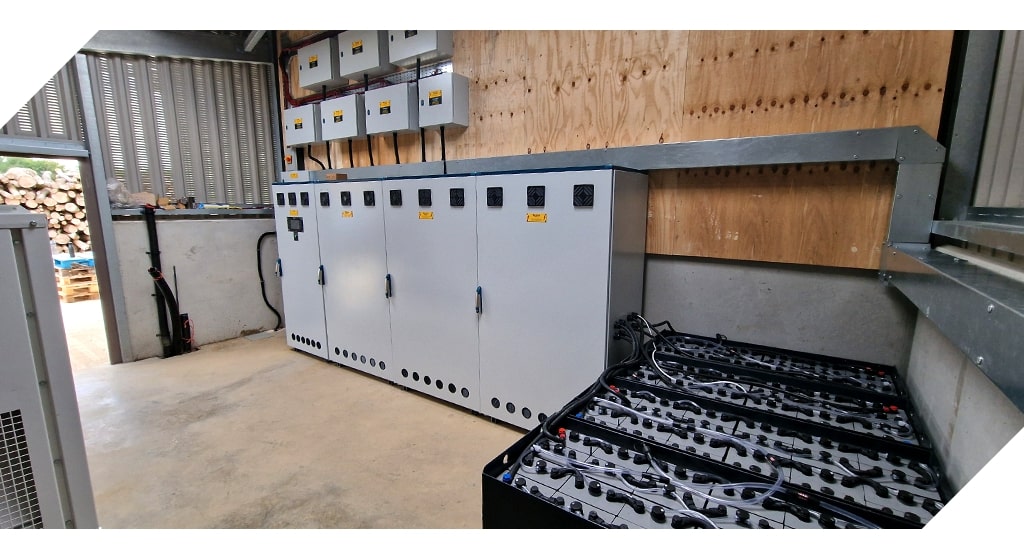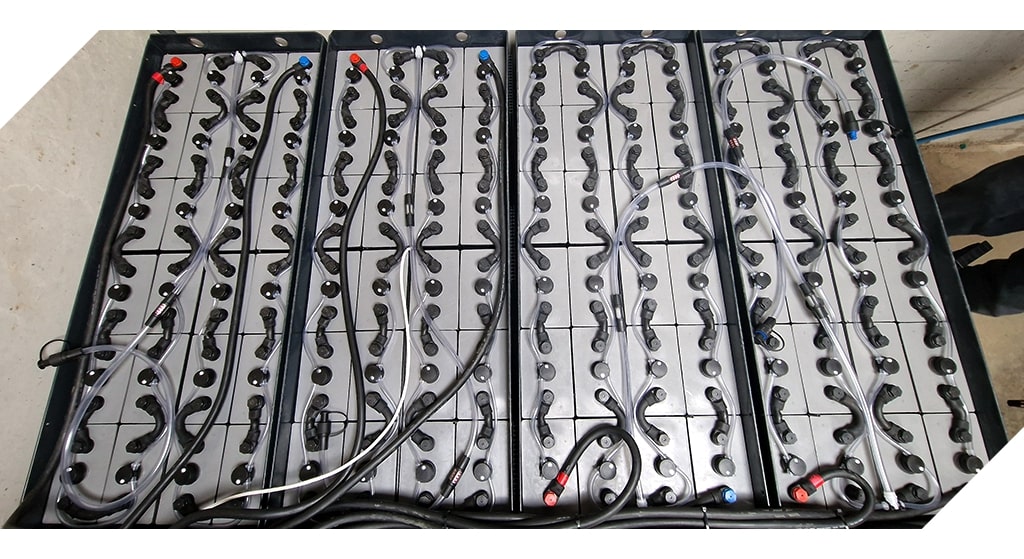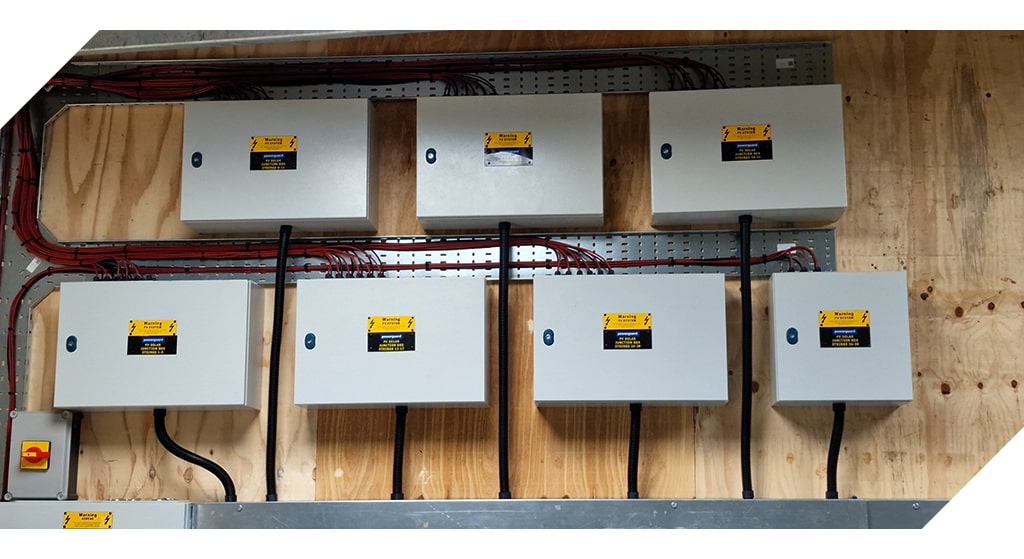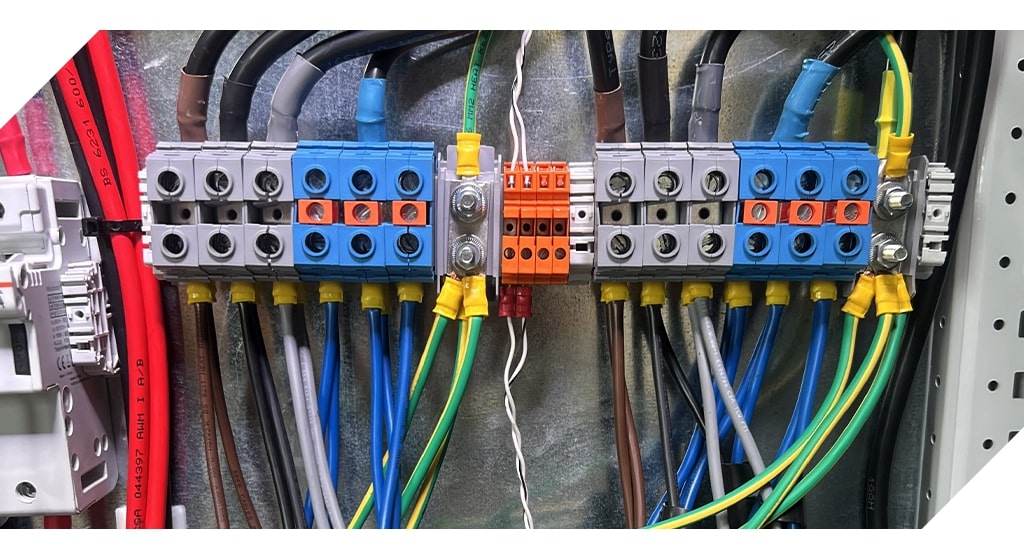This case study outlines the successful implementation of a renewable off-grid power system for Gardner Fencing, a log drying business in Northamptonshire, UK.
The business had moved to new premises and there was no grid connection available to them.
They reached out to us at Powerguard and we helped transition them to a renewable off-grid energy solution – comprising a 60 kVA PS control system, supported by four 930-amp battery banks (providing 178.56 kWh of storage) and 152 solar panels, each rated at 530W.
The solar and battery system now meets the company’s energy demands while significantly reducing costs, ensuring reliability and enhancing environmental sustainability.
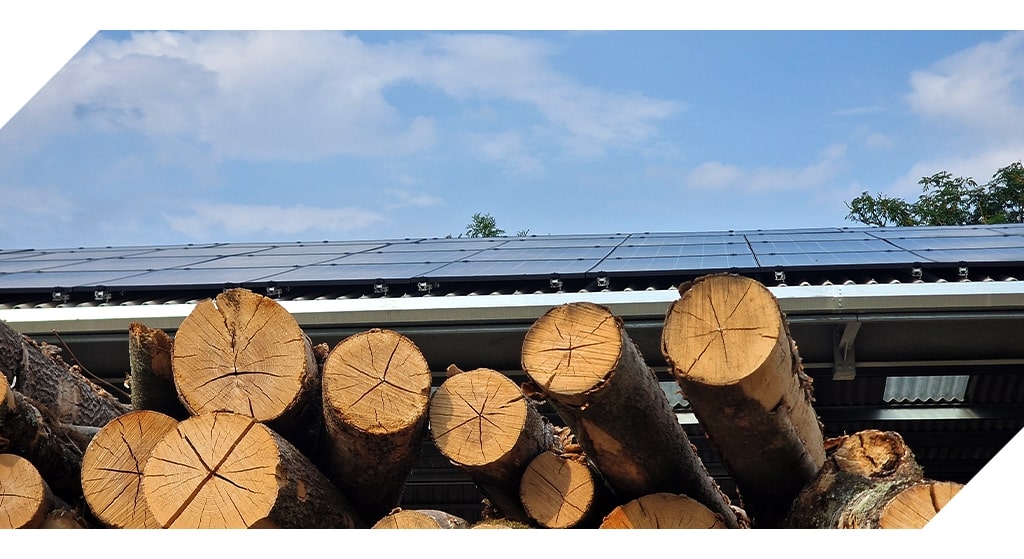
Contents
- The Off-Grid Power Supply Challenge
- The Powerguard Solution
- The Powerful Results
- Conclusion: Why Powerguard?
The Off-Grid Power Supply Challenge
Log drying is an energy-intensive process requiring consistent, round-the-clock power for running drying kilns – and all at the wrong time of year: winter. We looked at the problem and came up with a solution to suit their needs.
Gardner Fencing had no mains power available and potentially an unsustainable carbon footprint. To overcome these challenges, the business opted to install an off-grid power system with solar and battery storage.
The challenge for us at Powerguard was to provide a reliable, cost-effective and environmentally sustainable energy solution by integrating 152 solar panels, battery banks and a 60 kVA power control system.
Gardners also decided to move their main kiln drying season to the summer to utilise solar panels at their maximum efficiency and receive the greatest return on his investment.
This also served to make the biggest contribution to their sustainability targets.
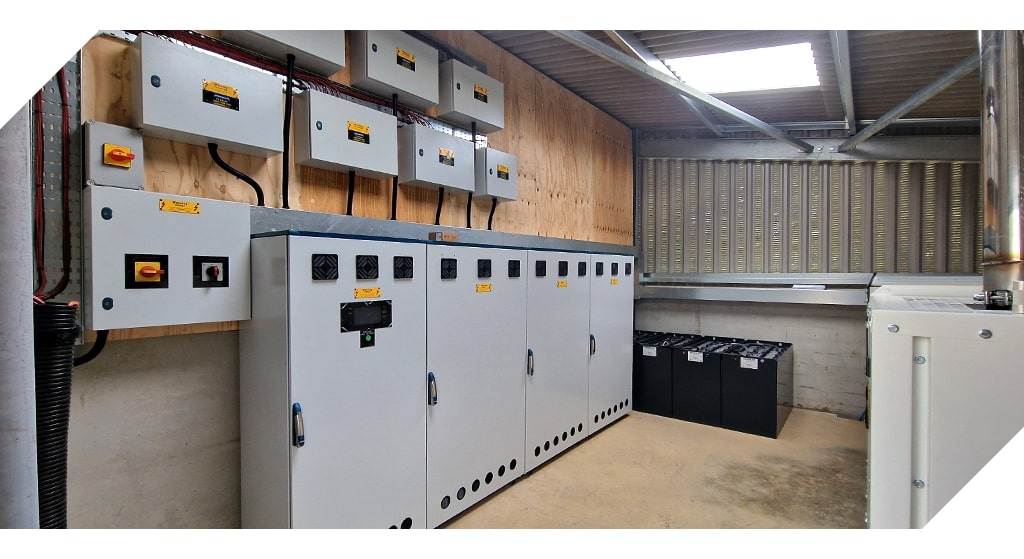
The Powerguard Solution
An energy audit revealed that Gardners required approximately 200 kWh of electricity per day to power its drying kilns and other essential operations. Given the high energy demands, the company needed a robust solar power system with adequate battery storage to maintain operations during low solar generation periods, such as at night or during cloudy weather.
The off-grid power solution was customised to meet the business’ daily energy needs, providing uninterrupted power while, at the same time, significantly reducing costs and carbon emissions.
The system included the following components:
Solar Panels:
Total System Capacity: 152 high-efficiency solar panels rated at 530W each, generating a total of 80.56 kW of power. The panels were installed across the roofs of the log drying facility to maximise solar exposure.
Daily Energy Production: The system was designed to generate approximately 300-400 kWh per day during peak sunlight conditions, more than sufficient to meet the daily energy demand of around 200 kWh.
Battery Storage:
Capacity: Four 930-amp battery banks provided a total storage capacity of 178.56 kWh. This ensured enough stored energy to power the facility during non-solar periods.
Energy Management: The batteries allowed the business to store surplus energy generated during the day and discharge it during nighttime or cloudy conditions, minimizing the need for diesel generator backup.
60 kVA Power Control System:
Energy Regulation: The power control system managed energy distribution between the solar panels, battery banks and critical machinery, ensuring efficient energy use while minimising wastage.
Backup Diesel Generator: Though the system was designed to meet 95% of the business’s energy needs through solar and battery storage, a diesel generator was kept for emergency use during extended periods of low sunlight.
Smart Energy Management System (EMS):
The EMS provided real-time monitoring of energy production, storage and consumption. It optimised the charging and discharging cycles of the batteries and ensured that the kilns always had priority access to energy.
The Powerful Results
The implementation of the off-grid power system delivered immediate and long-term benefits to the log drying business. The benefits included:
Energy Independence:
Gardners was able to meet over 90% of their energy needs through the solar panels and battery system, drastically reducing their reliance on diesel.
Cost Savings:
Fuel costs were reduced by over 70%, leading to savings of approximately £35,000 annually. Maintenance costs for the diesel generators also fell significantly.
Improved Energy Reliability:
The combination of solar panels and battery storage provided a consistent and reliable energy supply, minimising power outages and ensuring continuous operation of the drying kilns.
Sustainability:
The business reduced its carbon footprint by over 80%, as diesel usage dropped drastically. This helped the company align with industry sustainability goals and meet their environmental commitments.
Conclusion: Why Powerguard?
The off-grid solar power system, featuring 152 solar panels (530W each), a 60 kVA power control system and 89.28 kWh of battery storage@ 50% discharge, was a highly successful solution.
The system provided energy reliability, cost savings and environmental benefits, making it a valuable investment for Gardner’s long-term operations.
By adopting this renewable energy solution, they were able to achieve significant reductions in operational costs and carbon emissions, while ensuring uninterrupted power supply for their critical drying processes. This case study demonstrates the feasibility and effectiveness of off-grid power solutions for energy-intensive industries like log drying.
We are experts in off-grid systems small and large, trust us with your power supply and don’t throw money away with a grid connection.
Get in touch with us to find out more about what we can offer you!
Our Products
- Water Pumps
- Industrial (Three Phase)
- Industrial (Single Phase)
- Residential
- Portable
- Off-Grid Power Systems
- Central Battery Systems for Emergency Lighting
- Mini grid & EV charging
- Marine Systems
- Renewable Energy
- Generator & Control Systems
- Uninterruptible Power Supply (UPS) Systems
- Inverters & Inverter Systems
- Battery Chargers Systems
- Diesel & Gas Generators
